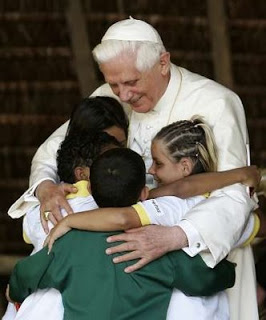Readings (Jerusalem Bible: Australia, England & Wales, Ireland, New Zealand, Pakistan, Scotland)
Readings (New American Bible: Philippines, USA)
Gospel Mark 1:29-39 (English Standard Version Anglicised: India)
And immediately Jesus left the synagogue and entered the house of Simon and Andrew, with James and John. Now Simon's mother-in-law lay ill with a fever, and immediately they told him about her. And he came and took her by the hand and lifted her up, and the fever left her, and she began to serve them.
That evening at sunset they brought to him all who were sick or oppressed by demons. And the whole city was gathered together at the door. And he healed many who were sick with various diseases, and cast out many demons. And he would not permit the demons to speak, because they knew him.
And rising very early in the morning, while it was still dark, he departed and went out to a desolate place, and there he prayed. And Simon and those who were with him searched for him, and they found him and said to him, “Everyone is looking for you.” And he said to them, “Let us go on to the next towns, that I may preach there also, for that is what I came for.” And he went throughout all Galilee, preaching in their synagogues and casting out demons.
One of the striking features of the Gospels is the number of times Jesus healed sick people, usually an individual, such as Simon Peter's mother-in-law in in this Sunday's gospel, sometimes all who were sick or oppressed by demons in the same gospel reading.
This week I will simply copy Pope Benedict's words on Sunday's gospel during his Angelus talk on this same Sunday in 2012. I will highlight what particularly strikes me.
Dear Brothers and Sisters,
This Sunday’s Gospel presents to us Jesus who heals the sick: first Simon Peter’s mother-in-law who was in bed with a fever and Jesus, taking her by the hand, healed her and helped her to her feet; then all the sick in Capernaum, tested in body, mind and spirit, and he 'healed many… and cast out many demons' (Mk 1:34). The four Evangelists agree in testifying that this liberation from illness and infirmity of every kind was — together with preaching — Jesus’ main activity in his public ministry.
Illness is in fact a sign of the action of Evil in the world and in people, whereas healing shows that the Kingdom of God, God himself, is at hand. Jesus Christ came to defeat Evil at the root and instances of healing are an anticipation of his triumph, obtained with his death and Resurrection.
Jesus said one day: 'those who are well have no need of a physician, but those who are sick' (Mk 2:17). On that occasion he was referring to sinners, whom he came to call and to save. It is nonetheless true that illness is a typically human condition in which we feel strongly that we are not self-sufficient but need others. In this regard we might say paradoxically that illness can be a salutary moment in which to experience the attention of others and to pay attention to others!
However illness is also always a trial that can even become long and difficult. When healing does not happen and suffering is prolonged, we can be as it were overwhelmed, isolated, and then our life is depressed and dehumanized. How should we react to this attack of Evil? With the appropriate treatment, certainly — medicine in these decades has taken giant strides and we are grateful for it — but the Word of God teaches us that there is a crucial basic attitude with which to face illness and it is that of faith in God, in his goodness. Jesus always repeats this to the people he heals: your faith has made you well (cf. Mk 5:34, 36).
Even in the face of death, faith can make possible what is humanly impossible. But faith in what? In the love of God. This is the real answer which radically defeats Evil. Just as Jesus confronted the Evil One with the power of the love that came to him from the Father, so we too can confront and live through the trial of illness, keeping our heart immersed in God’s love.
We all know people who were able to bear terrible suffering because God gave them profound serenity. I am thinking of the recent example of Blessed Chiara Badano, cut off in the flower of her youth by a disease from which there was no escape: all those who went to visit her received light and confidence from her! Nonetheless, in sickness we all need human warmth: to comfort a sick person what counts more than words is serene and sincere closeness.
Dear friends, next Saturday, 11 February, the Memorial of Our Lady of Lourdes, is the World Day of the Sick. Let us too do as people did in Jesus’ day: let us present to him spiritually all the sick, confident that he wants to and can heal them. And let us invoke the intercession of Our Lady, especially for the situations of greater suffering and neglect. Mary, Health of the Sick, pray for us!
[Sunday, 11 February, is this year's World Day of the Sick, which takes place each year on the Memorial of Our Lady of Lourdes, not observed this year because Sunday takes precedence.]
On a pastoral visit to Palermo, Italy, on 3 October 2010 Pope Benedict had this to say about Blessed Chiara [emphases added]: I do not want to start with a discussion but with a testimonial, a true and very timely life story. I believe you know that last Saturday, 25 September, a young Italian girl, called Chiara, Chiara Badano, was declared Blessed in Rome. I invite you to become acquainted with her. Her life was a short one but it is a wonderful message. Chiara was born in 1971 and died in 1990 from an incurable disease. Nineteen years full of life, love and faith. Her last two years were also full of pain, yet always of love and light, a light that shone around her, that came from within: from her heart filled with God! How was this possible? How could a 17- or 18-year-old girl live her suffering in this way, humanly without hope, spreading love, serenity, peace and faith? This was obviously a grace of God, but this grace was prepared and accompanied by human collaboration as well: the collaboration of Chiara herself, of course, but also of her parents and friends.
You may read more about Blessed Chiara Luce Badano in The Saint Who Failed Math by Richelle Verdeprado published in the September-October 2010 issue of MISYONonline.com, the magazine of the Columbans in the Philippines of which I used to be editor.
The whole of Pope Benedict's address to the young people and families of Sicily is well worth reading and reflecting on.
St Paul on Preaching
St Paul begins the Second Reading with these words: For if I preach the gospel, that gives me no ground for boasting. For necessity is laid upon me. Woe to me if I do not preach the gospel! (1 Corinthians 9:16).
n my 80 years I never remember such confusion in the teaching Church. We need to pray earnestly that all who are called to preach and teach the Gospel will be faithful to what the Church has handed down since the time of the Apostles, the teaching that they received from Jesus Christ.
The Ten Commandments apply to every person. No one is exempted from any of them, though none of us lives fully up to them. But Jesus has given the Church the great gift of the Sacrament of Penance/Confession/Reconciliation to forgive us and get us up on our feet again.
The first recorded words of Jesus are in the Gospel of St Mark, the first of the Four Gospels to be written: The time is fulfilled, and the kingdom of God is at hand; repent and believe in the gospel (Mark 1:15).
Traditional Latin Mass
Sexagesima Sunday
The complete Mass in Latin and English is here. (Adjust the date at the top of that page to 2-04-2024 if necessary).
Epistle: 2 Cor 11:19-33; 12:1-9. Gospel: Luke 8:4-15.
















